The long reign and tragic end of Nicolae Ceausescu
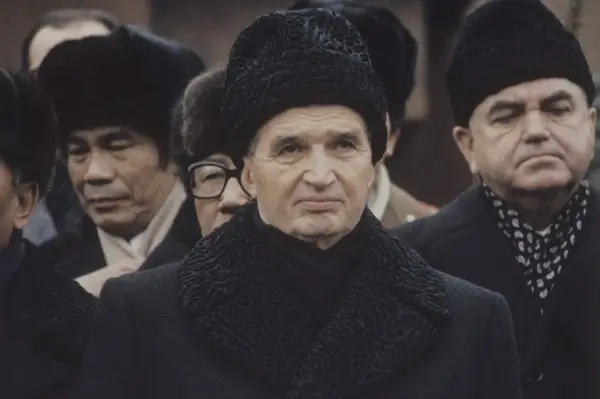
This ruler was quite mediocre, and in the last years of his reign - an openly weak politician, but this did not prevent him from remaining in power for 24 long years. During this time, Romania moved from economic growth to a regime of austerity, and in foreign policy it quarreled with everyone who could become its friend and ally. All this led to a completely logical result.
What was Nicolae Ceausescu like? Thanks to what, a person from a simple peasant family was able to reach the heights of power, how he managed it and why he ended up so sadly, we will tell you.
Youth
The future Romanian dictator was born in January 1918 into a poor peasant family and was the third of 10 children. At the age of 11, Ceausescu moved from his native village to Bucharest with his older sister, where he worked part-time at a factory and became an apprentice and then an apprentice shoemaker.
Since the teenager’s earnings were more than modest, young Ceausescu began to resort to petty theft. He was caught in one of them, and that’s how 15-year-old Nicolae ended up in prison for the first time. The prison experience greatly influenced him and actually predetermined his future fate. In prison, he met prominent figures of the communist movement, including the future Romanian leader Gheorghiu Deja, and also joined the Communist Youth League (CYU) of Romania.
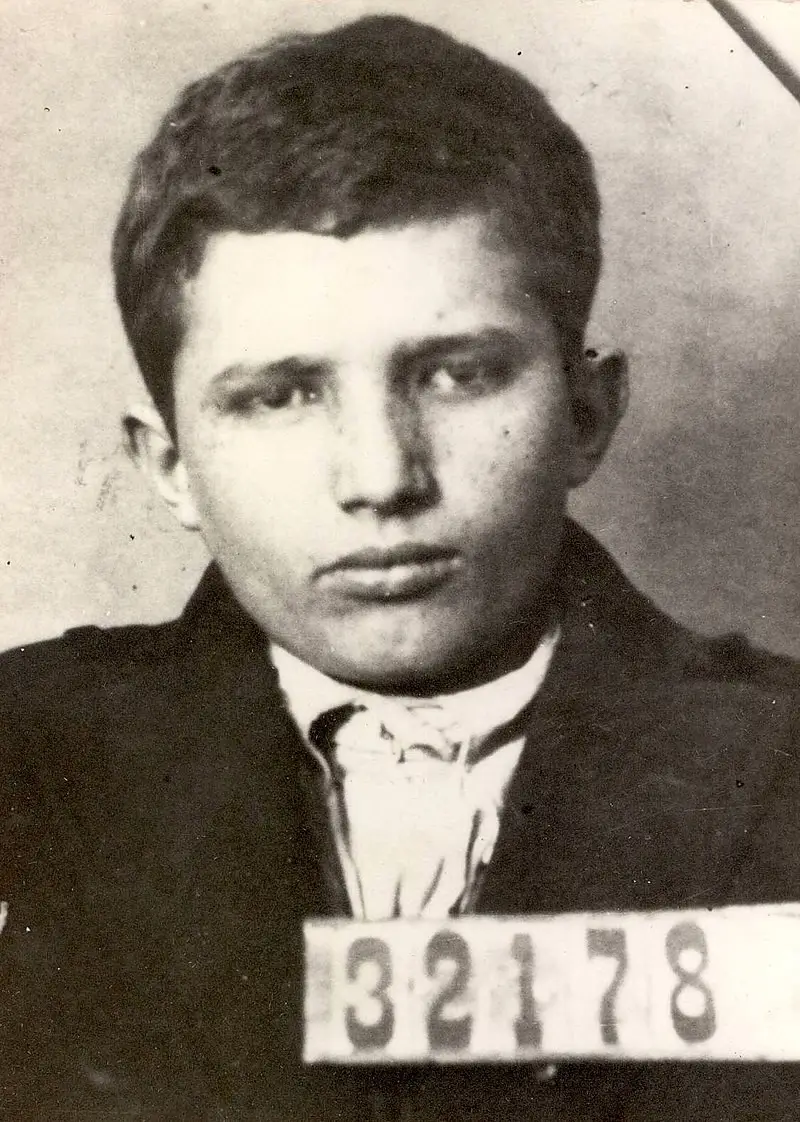
15-year-old Ceausescu during his first arrest, 1933
In the second half of the 1930s, Ceausescu was arrested several times, but only for participation in strikes and propaganda work. In prison, like many other prisoners, he was tortured, as a result of which he began to stutter.
General Stefan Kostial, who knew him in those years, spoke of him like this:
In 1936, Ceausescu joined the Romanian Communist Party. In 1940, he was once again arrested for propaganda activities and spent almost the entire Second World War in prisons and concentration camps. He was released only after the fall of the Antonescu regime in 1944. Since the communists came to power in Romania, Ceausescu's career skyrocketed thanks to his acquaintance with influential underground fighters who now occupied government positions.
In the late 1940s and early 1950s, Romania undergoes forced collectivization, which was met with hostility by most peasants. Once, encountering peasant disobedience in the Dambovita district, Ceausescu gave the order to open fire on unarmed people.
Thanks to friendly relations with Gheorghiu Dej, who led the country in 1947, Ceausescu became a member of the party's Central Committee in 1952, and a member of the Politburo in 1955. He holds the position of Deputy Minister of Defense and becomes a general, although he never served in the army. By the end of the 1950s, he effectively became the second man in the state.
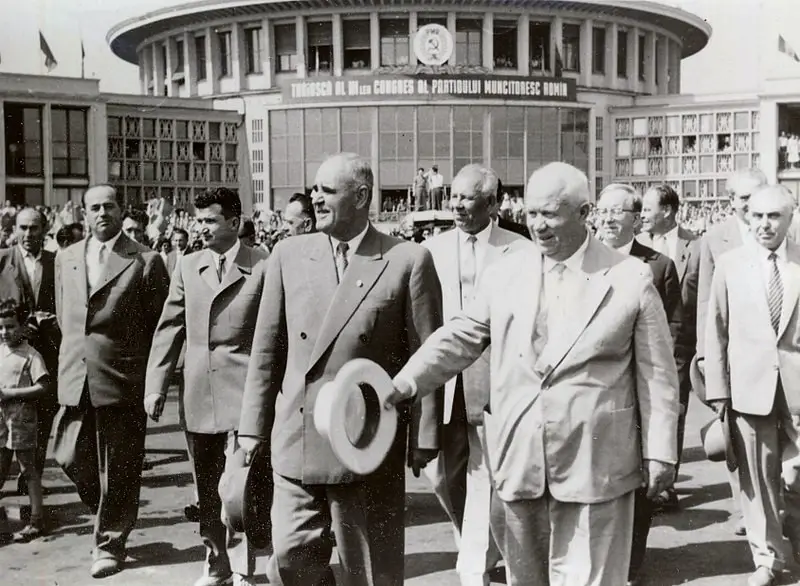
Gheorghiu-Dej, Khrushchev and Ceausescu at Bucharest airport before the 1960th Congress of the RWP, XNUMX
After the death of Gheorghiu-Deja from cancer in March 1965, Ceausescu was elected first secretary of the Central Committee, heading the party and state. The choice fell on him because he was considered a compromise figure; his colleagues did not rate his political abilities highly, so they hoped that he would become an obedient puppet in their hands.
In power
However, having come to power, Ceausescu did not intend to be an obedient tool in the hands of other party members. In the very first months, he appointed people loyal to himself to key positions in the country. Then, one by one, he removed from power representatives of the “old guard”, associates of Georgiu-Dej. The formal reason was their accusation of “immoral behavior" Gheorghiu-Dej himself, his friend and patron, thanks to whom Ceausescu made his career, now began to be criticized, and those repressed during his reign received freedom.
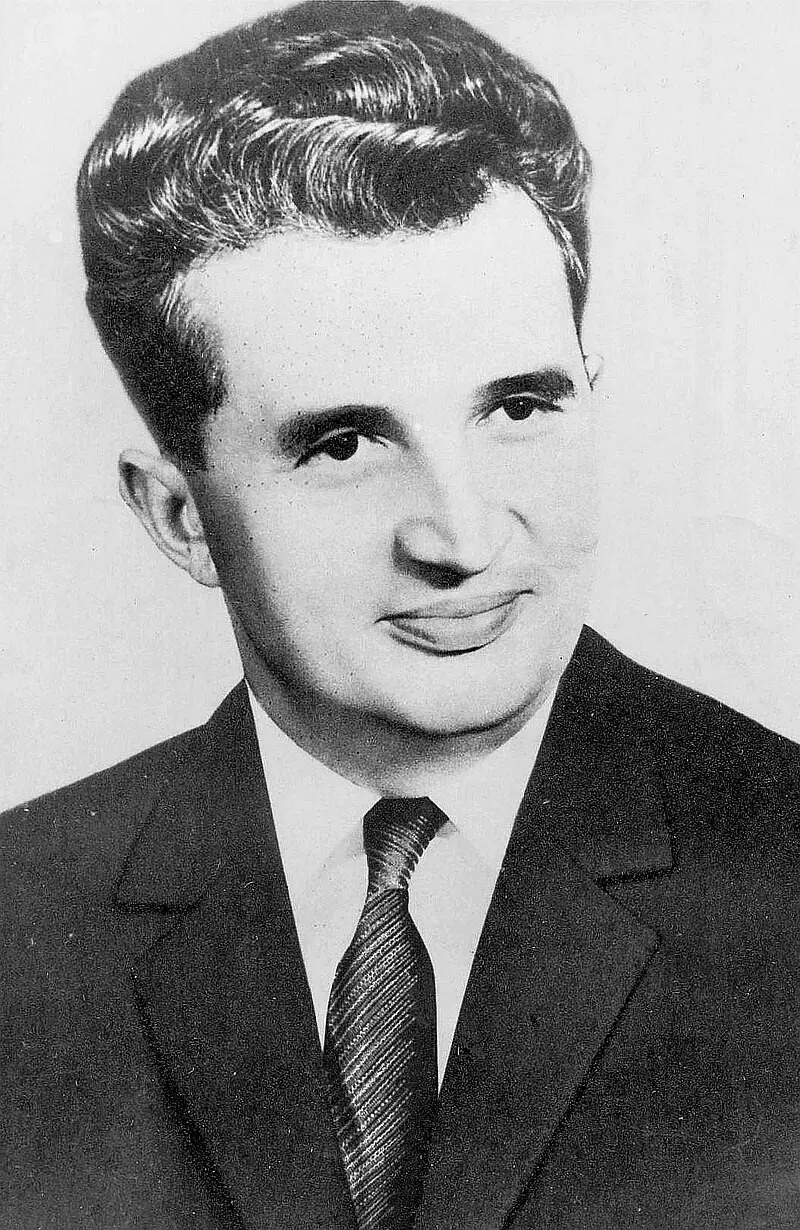
Ceausescu at the time of coming to power, 1965
In the early years, the Ceausescu regime was relatively mild. Thus, residents of the country had the opportunity to buy foreign press, the freedom of press of the Romanian press was higher than in other countries of the socialist camp. Citizens were able to freely enter and leave the country, and dissidents were no longer sent to concentration camps, giving them more lenient punishments.
In foreign policy, Ceausescu showed himself to be a peacemaker. For example, in 1968, he condemned the Soviet invasion of Czechoslovakia, saying that it was a big mistake, and during the Sino-Soviet conflict on Damansky Island, he took neutrality, not supporting either side.
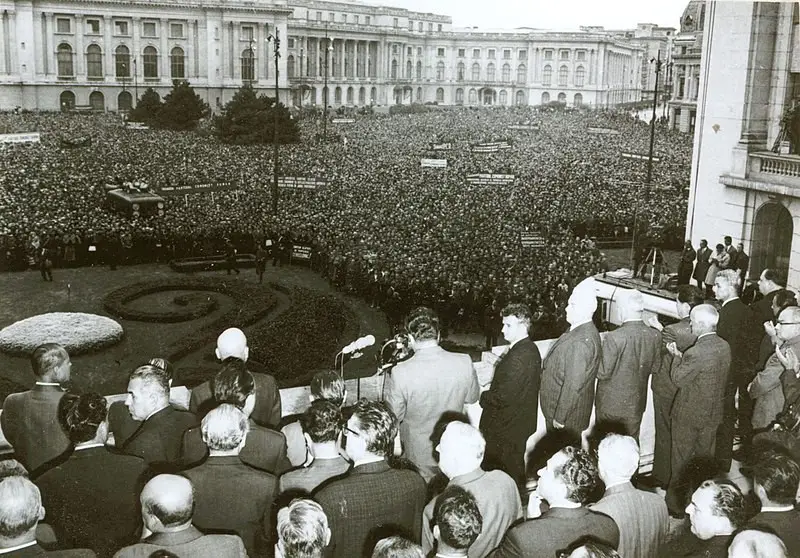
Ceausescu's speech at a rally against the entry of Soviet troops into Czechoslovakia in Bucharest, 1968
However, such liberalization did not last long. In 1971, Ceausescu made a series of visits to Asian countries - China, North Korea, Vietnam and others. In North Korea, he became interested in the Juche idea and the cult of personality of Kim Il Sung. Ceausescu decided to arrange something similar in Romania.
A turn towards totalitarianism began. In the same year, censorship was significantly tightened and propaganda praising the merits of “greatest son of the Romanian people" The Ceausescu personality cult began. Helpful propagandists attributed to him all the real and imaginary achievements of the country; in the press he was called “titan of thought”, “favorite son of the nation”, “hero of heroes”, “genius of the Carpathians”, “full-flowing Danube of reason” and other epithets of the like. Ceausescu did not tolerate criticism and, probably, he himself believed in his unusual genius. When an American journalist asked him how he felt about his cult of personality, Ceausescu replied calmly:
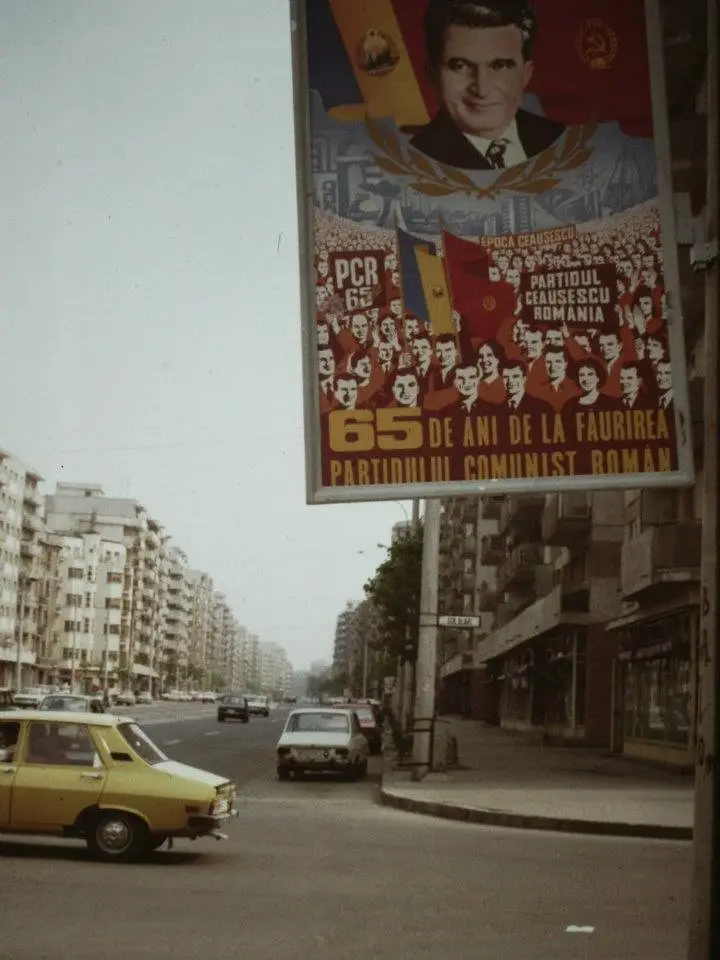
Propaganda poster in Bucharest, 1986
In addition, the “hero of heroes” also had a clear inferiority complex due to his height of 165 cm. All photographers and television workers in the country were ordered not to photograph Ceausescu standing next to tall people; compliance with this rule was strictly controlled.
Next, Ceausescu decided to gain full control over the citizens of Romania and completely eradicate any dissent. The state security agency Securitate began to play a major role, expanding more and more every year and gaining greater powers. Everyone who could speak out against the regime, who was dissatisfied with its actions and spoke out openly, soon found themselves in prison.
In governing the country, Ceausescu relied more and more on his relatives. In fact, the second person in the country was his wife Elena, who had a 4th grade education. She was elected academician, headed the Institute of Chemical Research, her name was put under the scientific works of the scientists of this institute, and propaganda called her “world famous scientists" But this will seem like a trifle if we remember that during the reign of Ceausescu, the Romanian Academy of Sciences seriously put forward the theory that modern Romanians are direct descendants of the ancient Romans.
Ceausescu's son Nicu, who was popularly called the prince, soon began to play a significant role in politics. He held a number of government positions, but is best remembered for his drunken sprees and related incidents. Daughter Zoya is remembered for her love affairs. And only the eldest son Valentin, who became a nuclear physicist, was a completely decent person, but he was not interested in politics and did not hold any positions.
In total, about 40 relatives of the dictator, who were popularly called the Ceausescu clan, received government positions.
Ceausescu himself and his family members were partial to luxury. He had 21 palaces, 41 residences, 20 hunting lodges.
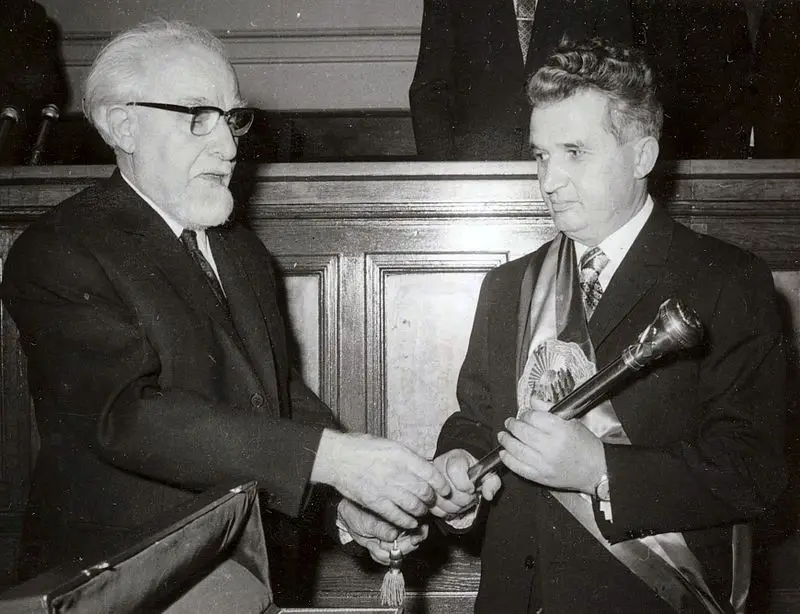
Ceausescu receives the presidential scepter from the hands of the President of the Grand National Assembly, Stefan Wojtek, 1974
The population of Romania during his reign was forced to tighten their belts every year. The 1970s saw economic growth, but it was driven by loans from Western countries. Soon the loans had to be repaid, and then a number of restrictions were imposed on the population of Romania, and total savings began on literally everything. The issuance of food using cards was introduced, the sale of gasoline using coupons, television broadcast only two hours a day. In winter, it was forbidden to use refrigerators, it was forbidden to use gas to heat apartments, and at night it was allowed to light no more than one light bulb in houses (and its power should not exceed 15 W). Any violation of these prohibitions was punishable by heavy fines. Thousands of beggars appeared in Bucharest and other cities of the country.
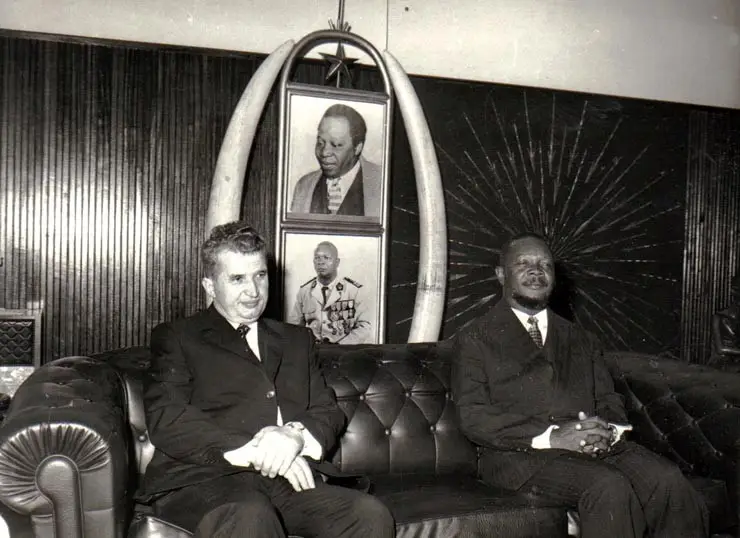
Meeting of Ceausescu with the President of the Central African Republic J.B. Bokassa, 1972
Ceausescu stubbornly refused to admit the failure of his own economic policy and blamed all the failures on his ministers, including Prime Minister Verdetz, who were immediately removed from their posts. But all this did not correct the situation, the people were driven to despair by poverty, and only a spark was needed for their discontent to explode. And soon this spark flared up.
Revolution
The Romanian people have expressed dissatisfaction with the Ceausescu regime since the 1970s. When the retirement age was raised in 1977, mass miners' strikes began, in which more than 35 thousand people took part. However, their protest was suppressed.
In the 1980s, new strikes of miners and workers of large factories swept across the country one after another, and in 1987 there was an uprising in the city of Brasov, suppressed by the authorities.
Added to the unstable internal situation were failures in foreign policy: by the mid-1980s, Romania’s relations with both the USSR and the West had deteriorated significantly. US President George H. W. Bush later recalled:
In this situation, Ceausescu refused to admit his own mistakes and begin any reforms. On the contrary, he decided with all his might to create the appearance of unprecedented popular support for his regime. Thus, in the 1985 parliamentary elections, the ruling Communist Party received 97,7% of the votes. However, these figures were far from the real state of affairs.

Ceausescu in Moscow at Brezhnev's funeral, 1982
And then December 1989 came. In the middle of the month, protests began in the western city of Timisoara against the eviction of a local Hungarian pastor. The protesting residents were soon joined by workers from nearby factories. On December 17, Ceausescu ordered Securitate state security forces and the army to open fire on protesters, killing more than 50 men, women and children. In the following days, use weapons continued, and the number of victims on both sides reached 1100 people.
However, the protest only grew. On December 21, Ceausescu ordered a large rally in his support in the center of Bucharest, to which the authorities brought about 100 thousand state employees.
When Ceausescu, being on the balcony of the palace, began to make a speech, a firecracker exploded in the crowd. Ceausescu fell silent in bewilderment. Following this, shouts were heard from the crowd, “Down with the tyrant!" and "Down with communism!" Unaccustomed to speaking in front of a hostile crowd, the dictator quickly left the balcony.
Meanwhile, clashes between protesters and the army and the Securitate began in the square, shooting rang out, and Tanks. The army began to go over to the side of the people.
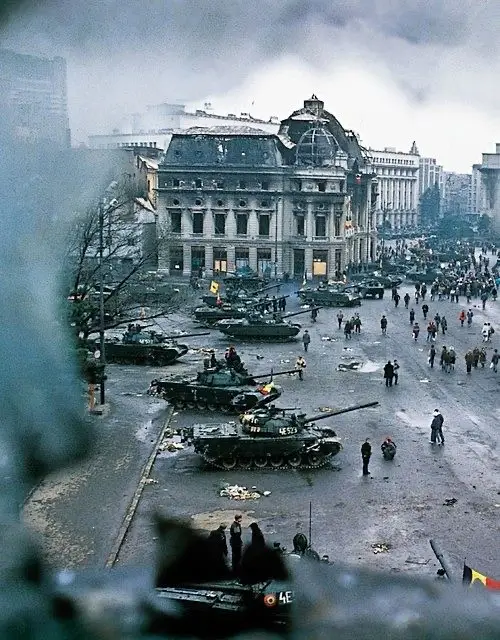
Clashes in Bucharest, December 1989
Seeing all this, Ceausescu, his wife Elena and several guards fled by helicopter from the roof of the palace surrounded by a crowd.
On December 22, it became known about the sudden death of Defense Minister Vasile Mil. A version immediately spread among the people that he was killed on the orders of Ceausescu because he refused to shoot at the protesters. By that time, the rebels had taken the presidential palace, the television center and other important facilities in the capital. The overthrow of Ceausescu was announced on television.
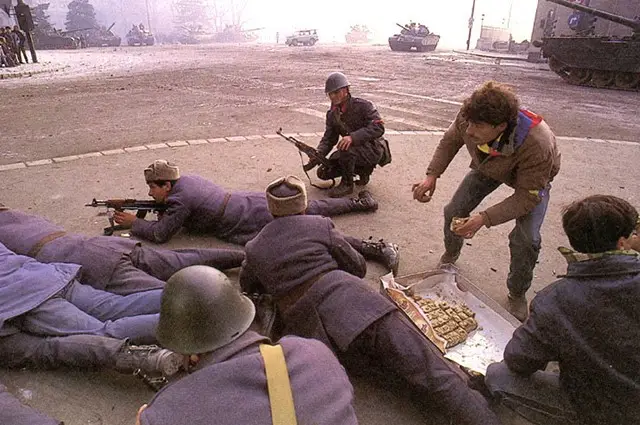
Armed clashes in Bucharest, December 1989
Under threat of being shot down, Ceausescu's own helicopter was landed in a field near the city of Targovishte, 75 km from Bucharest. Its pilot immediately went over to the side of the rebels, and the Ceausescu couple, while trying to escape, were arrested by the army.
On December 25, their trial took place, lasting just over two hours. The couple were charged under four articles of the Romanian Criminal Code: article 145 (destruction of the national economy), article 163 (armed action against the people and the state), article 165 (destruction of state institutions) and article 356 (genocide). They were found guilty on all counts and sentenced to death. On the same day they were shot in the courtyard of the soldiers' barracks.
So the Romanian Revolution, which lasted only 9 days, ended in complete victory.
Information